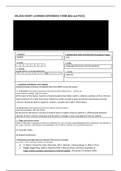WIL2020 SHORT LEARNING EXPERIENCE FORM (BEd and PGCE)
Student name and surname: Student number:
K A I T L I N J E R I C E V I C H 1 9 0 1 3 4 5 2
Programme:
X B.Ed PGCE
Learning Experience
number: 3
Learning encounter:
3
WIL2020 Short Form
PRO 280 /PRO 380 / PRO 410
1. SUBJECT: 2. KNOWLEDGE AREA INTEGRATION (Foundation Phase):
English N/A
1.2. DATE: 3. TOPIC
2 0 2 0 0 1 3 0
Language Structure and Conventions
1.3. GRADE:
(Indicate with an X on the appropriate box)
4. THEME
RR R 1 2 3 4 5 6 7 8 9 10 11 12
Adverbs
1. LEARNING EXPERIENCE OUTCOME(S):
Outcome/s based on General and Specific Aims from CAPS, in your own words:
1.1. At the start of this learning experience the learners should already know… and can do…
(state existing knowledge, skills and values)
At the start of the lesson, learners should already know what a verb is, what an auxiliary verb is, the two
main functions of a verb, how tense influences verbs, as well as past and present participles of verbs.
Learners should be able to organise, analyse, evaluate and collect information.
1.2. By the end of the learning experience the learners should be able to…
(state new knowledge, skills and values)
By the end of the lesson, learners should be able to explain what an adverb is, differentiate between
adverbs of time, manner and place and be able to change a noun and adjective into an adverb.
2. LTSMs (Educational media)
(Name LTSMs used in learning encounters and reference ALL your resources under Bibliography/List of references. Pay attention to
the variety, relevance, effectiveness and applicability of the LTSM you selected for the learning experience).
2.1 YouTube Video
2.2 Adverb Worksheet
3. Bibliography (abridged Harvard method) of All sources consulted
(e.g. Smit, L. 2011.Teaching. Pretoria: Van Schaik)
• St. Mary’s School for Girls, Waverley. 2012. Adverbs. Johannesburg: St. Mary’s Print.
• Wiggle Giggle Sing. (2015). Adverbs (That’s How Its Done). [Online]. Available at:
https://www.youtube.com/watch?v=5WILPCceMGE. [Accessed 25 January 2020].
, 4. PHASES OF THE LEARNING EXPERIENCE:
4.1 THEME (Context; big idea):
(What theme will you use to contextualise your learning experience, link it to learners' real world and introduce your topic?)
I will use the theme of food to introduce the topic of adverbs. I will ask the learners how they would
describe how they eat food. For explain, “The boy eats his food …” and I will ask the learners to complete
the sentence by suggesting adverbs to describe how the boy eats. This will link with learning encounters
one and two by using the continuous theme of food to link to the learners’ real world.
4.2 PREPARATION/INTRODUCTION (Time allocated 5 minutes)
(Capture attention, stimulate interest, create learning atmosphere, encourage active inquiry, teacher-learner dialogue, awaken prior
knowledge. Explain how you will use your theme in 7.1 to introduce the learning experience):
I will begin the lesson with a brief revision of verbs. I will ask the learners a series of questions to cover
what a verb is, its two main functions, auxiliary verbs, past and present participles of verbs as well as the
importance of the tense of a verb. Once the revision is complete, I will introduce the topic of adverbs.
The YouTube video will be set up before hand and copies of the Adverb worksheets will be printed
before the lesson.
4.3 ENGAGEMENT/DEVELOPMENT (Time allocated 25-30 minutes)
(Continue teacher-learner dialogue to start with new knowledge, learner-centred activities, applicable content, consider questions to
guide learners towards critical thinking, show sequence of teaching events, scaffolding, etc.):
I will first show the learners the YouTube video about adverbs. Following this, I will hand out the
worksheets and work through it with the learners. By using a series of questions, I will work through the
meaning of an adverb, the function of an adverb, the different types of adverbs and how to create an
adverb from a noun. After the content knowledge of the lesson is complete, I will explain the various
exercises the learners are required to complete as the assessment part of the lesson.
For the assessment part of the learning encounter, there are four exercises that assess the content
knowledge covered in the first half of the lesson. The learners will receive 10 minutes of the
developmental stage to complete the exercises. I will walk around the classroom and answer questions
should they arise. Learners are encouraged to help each other where it might be possible.
4.4 CONSOLIDATION (Time allocated 5 minutes)
(Consider ways to ascertain that learners have achieved the outcomes, recapping of main teaching points, assessment, wrap up,
how does the learning experience lead to further learning?):
I will end the learning experience by briefly asking the learners what an adverb is, what the function of an
adverb is and the different types of adverbs. I will then remind the learners how to change a noun to an
adverb.
I will assess a learners’ progress and understanding through observation, during the course of the
learning encounter. Furthermore, the learners’ ability to apply the content knowledge learnt during the
lesson will be assessed when the exercises are completed.




